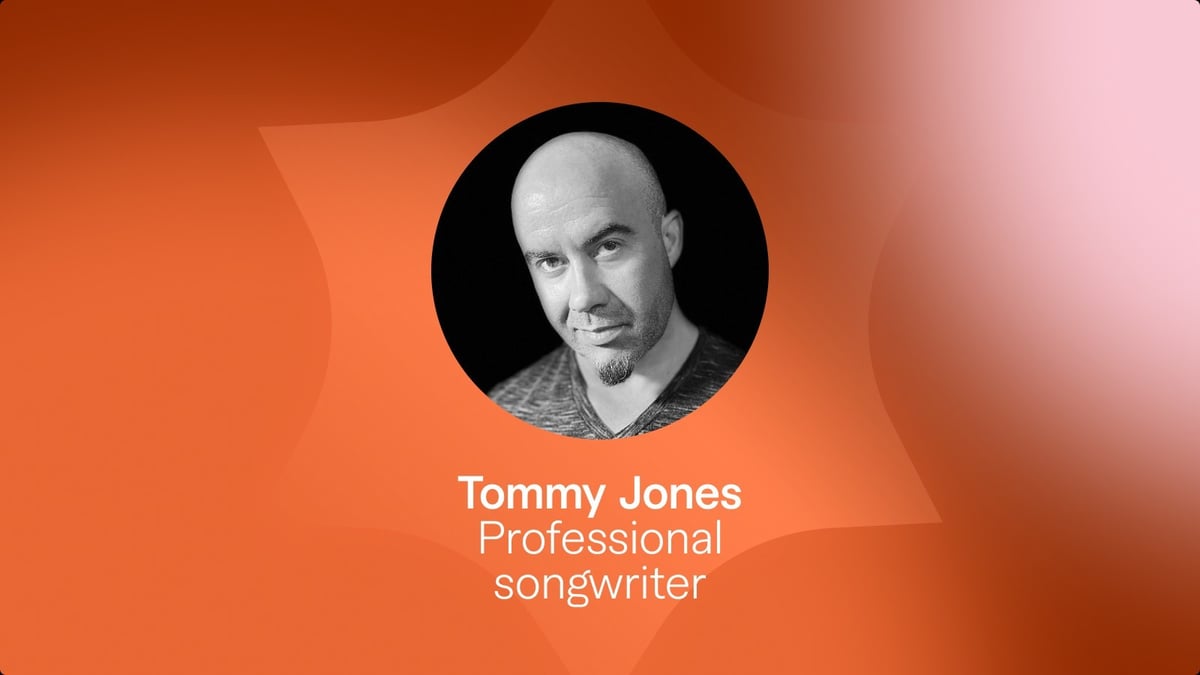Fear and loathing in the machine: A pro freelancer's journey into the heart of AI

# future of work
# AIforFreelancers
A raw, reflective look at AI, creativity, and staying relevant in the age of machines.
June 17, 2025 · Last updated on July 7, 2025
damooch916

First your clients will question new technology, then they will demand it.
I’m telling you, kid - that box is gonna take over music. First the studio, then the writers, then the stage …
This was Sacramento musical icon Danny Hart. A local legend of the 1960’s, Danny broke into nationwide success with his band “Spiral Staircase” and their smash hit “More today than yesterday."
Only... this wasn’t the 1960’s. This was the early 90’s.
Danny folded his arms over the table, looked into the smattering of a 1:30 am audience and then back to my 13 year old face.
One day bands will just be some computer.
I think about that moment often.
The Future, Told Early
The venues of the 1990’s West coast circuit can mush together in my mind. The painted-black bars, the long dance hall aesthetics, the clashing of glass and voices. It doesn’t take long for the road life to become one endless scene, even for a child performer operating on hopped up nerves and too much coffee. But I vividly remember Danny’s eyes as he summoned the spirits and forecast the technological future. I can see his bearded face; calm and decided. Free of burden and yielding to the fates. The future was coming - and Danny Hart was staying behind.
For years I wrestled with the moral of this story.
Then, sure enough, recording strongholds fell away with the rise of home studios. Songwriting staffs were fired in the wake of streaming and its evisceration of the royalty model. Instrument sales plummeted and rock stars no longer played rock, nor did they play. The machine had, just as Danny predicted, taken over. Perhaps this was the moral of the story. The evils of progression. The noble warrior fighting against an unbeatable army. Maybe Danny is the hero, technology is the villain and I am the witness. Or …
A Story of Generational Replacement
Maybe this is the story of generational replacement. To the swing musician, Danny Hart represented sound-effect music, with its peddles, keyboards and its bells and whistles. To his elders, Danny was the threat of the modern age and the technology that it represented. Perhaps, if you look hard enough, you can find evidence that we're asking completely different questions regarding the technology today versus the 1960's. But the fears are the same. More than that, the outcome will be the same as well. We're going to move forward. Some of us in front, most of us together and a few of us behind. Your generation is creating the very tools that the next generation will master. If you participate - your soul is in there. Your ideas are in there. Your uniqueness is needed and it can't come from anywhere else.
You are extremely necessary.
Be an Experiment, Not a Philosophy
For me, the answer to the question of radical transformation is a little bit different. I’ve found my place in the home studio market. I’ve established myself in the production firm realm and I’ve built connections in the new music industry, a place just outside of traditional songwriting staffs, publishing deals and long term contracts. Quite frankly, I wouldn’t trade.
What radical transformation asks of me is the same question that it’s always asked, it’s the face of the inquirer that’s different. I incorporate AI into my music services because my customers expect expertise. As a PRO seller, I represent Fiverr’s promise to deliver the highest quality content using the latest innovations. My buyers expect me to interact with the applications that shape my professional world - and then they seek answers. There’s nothing to moralize - because AI, much like the internet before it, doesn’t need your opinion to reshape the way we live. It’s my responsibility to understand AI’s relationship to the current musical ecosystem. It’s my task to navigate the options available to me and it’s my job to offer those tools to my customers. As Will Bryant, Fiverr PRO - business Consultant stated,
My buyers deserve the best services and that requires the best tools.
Return to Pepper Land…
To the casual observer - the rise of AI may have seemed like just another sleight of hand trick. To the music world, AI productions were gimmicks and curiosities. YouTube was littered with odd videos claiming the impossible. Elvis was singing on Michael Jackson tracks. Michael Jackson was covering Prince - and Morgan Freeman was reciting every known piece of dialogue in film history.
I didn’t think much of it until I ran across a “Beatles” song by a user named Dae Lims. I was particularly curious as to a video song title - “New - The Beatles.” If you’re unfamiliar, “New” is the title track of a 2013 Paul McCartney album of the same name. Curious, I pressed play. The production was the same crisp, pushing track that I was familiar with but as McCartney entered the melody, my professional life was changed.
Instead of the raspy, aged voice of the current Paul McCartney, this was a vibrant, youthful Paul. Far from a cheap approximation, this was the actual Paul, the1967 version, with all of his early nuance and vocal textures. Just as I was wrapping my head around the authenticity of this moment - John Lennon’s voice broke through to the chorus and chills ran through me. Here was the impossible, done precisely. A song released thirty years after the passing of John Lennon was showcasing his talent … and for better or worse - it felt absolutely valid.
As the song finished, my first reaction was guilt. Not because this wasn’t an authorized Beatles release … and not for any feeling of moral authority … but something incredibly unexpected had occurred:
I liked this version better than the original.
Tools vs. Fears
In the coming months, Lims would experiment with sound alteration, instrument enhancement, demo completion and incorporating new performances over older tracks. This all culminated in his master work - finishing the abandoned Paul McCartney demo “Return to Peoperland.” It was a masterclass in new music technology. By extracting instruments from various Beatles songs, Lims had reconstructed Ringos drums, Beatles harmonies, era appropriate sound effects and he had perfectly recreated the late sixties Beatles sound.
“Made with AI,” the video read and faded away.
This wasn’t a choice, it was the sound of the gauntlet being pounded into the new world. Sure, I could immediately retreat into emotionally litigating the unauthorized use of copyrighted material, but something more important was hanging over me. These tools were now here. From every corner of the earth, song makers are only limited by their willingness to learn prompting, technical terminologies and adaptability. My competition was expanding, but so were my resources. Having lived through the metamorphosis of the internet, learning to use AI felt less like a choice and more like a function of my job. I looked to the effects of the internet on modernity to guide my understanding of this new revolution.
Welcome … to the machine
Yes, in the wake of an all encompassing change - many things will fall away, but the internet created an open door between my services and the world. No matter the sacrifices, a technological revolution allowed for me to live my dream and feed my family. It’s with this knowledge that I approach AI. Beyond relevancy, AI accesses features that enhance my offerings. It pushes me closer to the sound in my head. And that’s the job. No matter what it takes, no matter what may come - the job is to get the sound in your imagination out to the world.
I started with a simple question and a client need: Can I provide female vocals by converting my voice to the sound in my head? For this task I took to kits.ai and began experimenting with vocal conversion. As their offerings widened, I discovered that I could use the tools to solve functionality issues. Vocal doubling, mix thickness and harmonies could now be streamlined and issued instantly. With one voice, I could generate differently textured harmonies. This was an instantly transformative feature to my Fiverr services.
My next question concerned tracking music. As a producer, I pride myself on creating all the instrumentation in my songs. Normally, this sees me sitting at the piano and performing each sound by hand through a combination of VST’s and real time sounds. Though I’m not a guitarist, I devote an abnormal amount of time to tracking acoustic and electric guitars, including solos, through careful articulation on my Yamaha MODX- 8. In many cases, this limits my mixing space as deadlines are always present. I wanted a way to quickly demonstrate my guitar ideas on the piano and convert those concepts to real guitar sounds. Luckily Suno was beta testing audio uploads.
These days, it’s not uncommon for me to record two vocal harmonies and prompt full gospel choirs. Through extensive research and years of musical exposure - I can specify certain terms and turn piano notes into realistic guitar solos, including my amplifier of choice, in under five minutes. Mastering services like “Landr” and “Fadr” allow me to allocate my time properly. Voice cloning has allowed me to significantly reduce my vocal recording time and plug-in services like “Output co-producer” can instantly declutter sound banks, finding precisely the right instrument based on my text prompt alone.
What Does This All Mean?
Better productions. A truer representation of the song that plays in my mind. Access to new ideas. Fearless writing that doesn’t operate via limitation and - above all else - more value for my buyers. It isn’t perfect. Despite my extensive training, language models aren’t yet capable of deciphering my proprietary methods when writing lyrics. But soon that will change. I’m not trepidatious about it, after all - my trainings and my philosophies will one day generate instant lyrics for multiple customers simultaneously. This will enable me to scale a portion of my business that was once entirely contingent on my limited time. Personally, I can’t wait to co-write with myself, this way I can finally see if my standards are as high as my co-writers joke about.
The Real Question
What AI asks of you is no different than what the railroad asked of your ancestors. It’s the same trembling question posed to you by the computer. It’s the same call to adventure, with all of its aches, its triumphs and its need to revolutionize, that we incurred during the rise of the internet.
The question is not “will you use it?”
The question is “are you ready?”
And make no mistake, it won’t wait for you to answer.
Curious how creative control and cutting-edge tools can work together? Explore Tommy’s Pro gig and hear what’s possible here.
18
Comments (18)
Popular
Dive in
Related
Blog
The human behind the AI: How curiosity, creativity, and a cat built my career in AI art
By Ai Lani • Jan 27th, 2026 • Views 855
Blog
Pixels and Possibilities: Navigating the Impact of AI on the World of Photography
Nov 2nd, 2023 • Views 7
Blog
Pixels and Possibilities: Navigating the Impact of AI on the World of Photography
Nov 2nd, 2023 • Views 7
Blog
The human behind the AI: How curiosity, creativity, and a cat built my career in AI art
By Ai Lani • Jan 27th, 2026 • Views 855

